Funeral Mass, first all-female flyover held for pioneering Navy pilot
Story by Bill Brewer
Photography by Stephanie Richer
Archive Photos courtesy of U.S. Naval History and Heritage Command and U.S. Naval Institute
Rosemary Mariner was full of firsts.
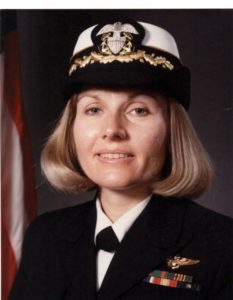 To the world, Capt. Mariner was an aviation pioneer who broke through the ranks of the all-male military aviator corps to become the U.S. Navy’s first female attack-jet pilot. To those close to her, Rosemary was a down-to-earth wife, mother, and Bible study leader who was as humble as she was faithful.
To the world, Capt. Mariner was an aviation pioneer who broke through the ranks of the all-male military aviator corps to become the U.S. Navy’s first female attack-jet pilot. To those close to her, Rosemary was a down-to-earth wife, mother, and Bible study leader who was as humble as she was faithful.
Capt. Mariner, who in retirement taught military history at the University of Tennessee and led a Scripture study group at St. Joseph Parish in Norris, is being remembered for a number of firsts she achieved during a stellar military career.
She died Jan. 24 at the age of 65 after a five-year battle with ovarian cancer.
The Navy honored the life and legacy of Capt. Mariner by conducting its first-ever all-female flyover during her burial service on Feb. 2 at New Loyston Cemetery in Hickory Valley, between Norris and Maynardville. She was laid to rest with full military honors.
Seven Naval aviators, all women, flew their F/A-18E/F Super Hornet attack jets in the “missing man flyover” formation to recognize a fallen comrade — the one who first opened the cockpit for them. The aviators were from Naval Air Station Oceana in Virginia Beach, Va., where Capt. Mariner had served early in her Navy career.
Monsignor Bill Gahagan, who was pastor of St. Joseph before his retirement, celebrated the Feb. 2 funeral Mass for Capt. Mariner at the Norris church, with Father Richard Armstrong, the current St. Joseph parochial administrator, concelebrating. Monsignor Gahagan said Capt. Mariner exemplified the Gospel.
“John’s Gospel comes from the great words of Jesus and says, ‘I am the Way, the Truth, and the Life.’ But what does ‘the Way’ mean? For Rosemary, she found that way in her life, in the life of her husband and family, in the life of her career, in the life of her relationships with people. In the most unassuming way, she did it Jesus’ way as far as I’m concerned,” Monsignor Gahagan said during his homily.
“She recognized within herself that the way was Jesus’ way, to see the gift that God had given her, a gift that she didn’t keep or possess to herself but reached out and gave to others in so many ways. All of you know this. There are hundreds and thousands of people who she has contributed her gifts and talents to in friendship, relationships, and in working with peers, to be there with them to guide and inspire,” Monsignor Gahagan added.
He emphasized that Capt. Mariner was generous in sharing her gifts.
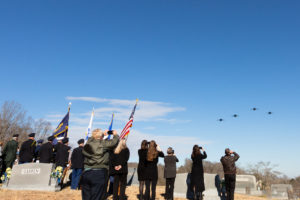
U.S. Navy pilots perform the first-ever all-female missing man flyover to honor naval aviation pioneer Capt. Rosemary Mariner.
“Rosemary did not shortchange her gifts at all. In truth, she had to do what she did; she gave the greatest gift of all to the world — the spirit of God’s life and love. We all contribute together to the building of God’s kingdom. She did it in her way,” Monsignor Gahagan said. “In life, she lived a glorious life and enjoyed life. … I am the Life; I am the Way, and the Truth. Let perpetual light shine upon you, Rosemary.”
Rosemary Bryant was a native of Harlingen, Texas, who grew up in San Diego. She was the daughter of a Navy nurse and an Air Force pilot who was killed in a plane crash when Rosemary was just 3 years old. With the military in her blood, she was determined to follow in her parents’ footsteps.
She not only followed, she led.
At the age of 17, she earned her private pilot’s license, and in 1972 at age 19 she graduated from Purdue University with a degree in aeronautics, the first female student to graduate from the same Purdue aviation program that Amelia Earhart worked with. She then joined the Navy with a desire to fly planes.
In 1973, the Navy lifted its ban on naval aviation training for women, and Rosemary Bryant was accepted into the first class of female Navy pilots. In 1974, at age 21, she earned her wings and became the first woman to fly a tactical attack jet, flying the A-4E/L Skyhawk and the A-7E Corsair II.
Other firsts include her being among the first women to serve aboard a Navy warship, the USS Lexington in 1982, qualifying as a Surface Warfare Officer; and in 1991 becoming the first woman to command a military aviation squadron, Tactical Electronic Warfare Squadron 34 (VAQ-34) based at Point Mugu, Calif. She was in command of the squadron during the Gulf War, although military rules at the time prohibited women from flying combat missions.
Before retiring in 1997, Capt. Mariner, who was among the first four women promoted to captain in the Navy, had logged more than 3,500 flight hours in 15 different aircraft and made 17 aircraft carrier landings, one of the ultimate tests of a military aviator.
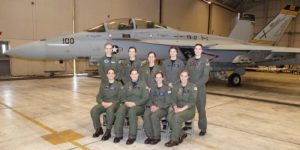
The U.S. Navy pilots who participated in the first all-female missing-man flyover were Cmdr. Stacy Uttecht, Cmdr. Leslie Mintz, Lt. Cmdr. Paige Blok, Lt. Cmdr. Danielle Thiriot, Lt. Cmdr. Jennifer Hesling, Lt. Christy Talisse, Lt. Amanda Lee, Lt. Kelly Harris, and Lt. Emily Rixey.
In addition, she earned a master’s degree from the National War College in Washington, D.C., and served on the staff of the Joint Chiefs in the Pentagon.
Her husband of 39 years, retired Navy Commander Tommy Mariner, described his wife as being instrumental in changing Navy regulations to allow women aviators to serve in combat.
Cmdr. Mariner said his wife led efforts in the 1990s to convince the federal government to do away with the combat exclusion rule for women aviators.
“Rosemary pushed in 1992 to get the combat exclusion rule removed,” Cmdr. Mariner said. “She wanted to open up doors and have other people walk through those doors. Rosemary always wanted to avoid being called an exceptional woman. She didn’t want to be looked at as a woman but as an individual, because that is how she treated all military personnel regardless (of their gender, race, or ethnicity).”
In fact, he said a mentor instrumental in her career was Capt. Ray Lambert, an African American who was the commanding officer of one of the first squadrons to which Capt. Mariner was assigned. Cmdr. Mariner said Capt. Lambert recommended his wife for jet training, which propelled her military career. Capt. Mariner delivered a eulogy at Capt. Lambert’s funeral, and Capt. Lambert’s son attended Capt. Mariner’s funeral.
“She had lots of men who opened doors for her, and she used her skills and talents to keep those doors open. She was instrumental in a lot of openings the Navy made,” Cmdr. Mariner recalled.
The couple, both Naval attack jet pilots, met in the mid-1970s while on assignment in California. They managed a courtship despite being in different sections of Navy aviation. He proposed to her in a tobacco field on the Mariner family farm in Union County, and they married in 1980.
Cmdr. Mariner called their relationship another Navy first — the first pilots to serve while married.
While Capt. Mariner was born in Texas and raised in California, Cmdr. Mariner was born at St. Mary’s Hospital in Knoxville and first lived in Union County. His family later lived in Campbell, Claiborne, and Roane counties.
After his retirement from the Navy in 1995 and hers in 1997, the couple settled in East Tennessee, where Cmdr. Mariner founded and led the Navy ROTC program at Anderson County High School. Their daughter, Emmalee, a National Merit Scholar, attends Duke University.
Cmdr. Mariner retired from Anderson County High School following the 2017-18 school year to care for his wife, whose health was declining. He noted that Emmalee took two years off from college to help care for her mother.
“She was very much a pioneer,” Cmdr. Mariner said about his wife.
Cmdr. Stacy Uttecht, commanding officer of Strike Fighter Squadron 32 (VFA-32) at Naval Air Station Oceana, who led the flyover, called her participation in Capt. Mariner’s funeral an honor.
“Being a part of this flyover is truly an honor; being a part of something that’s honoring someone like Capt. Mariner, who really was a trailblazer for female Naval aviators,” Cmdr. Uttecht said. “The second piece is that it’s really awesome to be part of an all-female crew, which is something the Navy has never done for a military flyover.”
Cmdr. Uttecht credited Capt. Mariner with making it possible for her to be a Naval aviator and believed it important to honor the pioneer.
“Capt. Mariner truly was a trailblazer. She basically made it possible for us to do our jobs that we’re doing today. I’ve never had anyone tell me no in the Navy. No one has ever told me I couldn’t go on deployment or fly jet aircraft. Those are the types of things women like Capt. Mariner were up against. She was in the first class of female Naval aviators to get their wings of gold. To be able to pay tribute to someone who truly made it possible for me to follow my dream from when I was a little girl is something I will never forget.
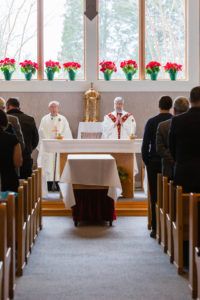
Monsignor Bill Gahagan, left, and Father Richard Armstrong celebrate the funeral Mass for Capt. Rosemary Mariner at St. Joseph Church in Norris.
“Capt. Mariner absolutely opened the door for me to be the Naval aviator I am today. Without her, I would not be able to stand here and be the commanding officer of an F-18 squadron. She was the first female to be the commanding officer of an attack fighter squadron, which is pretty awesome, and it opened the door for us. We have a lot more females who are flying in the Navy, especially in tactical aircraft, than there were even 15 years ago. And that all started because of women like Capt. Mariner,” Cmdr. Uttecht said.
Cmdr. Uttecht pointed out that more women are holding leadership positions in the Navy, and she is the second female to be commanding officer of an F/A-18 squadron. The first commanding officer of an F/A-18 squadron a dozen years ago was Sara Joyner, who now is a Navy admiral. A third female is serving as an executive officer, and Cmdr. Uttecht indicated a fourth woman could soon be promoted to a leadership post.
She was inspired by Capt. Mariner’s tireless efforts to have the military exclusion rule that prohibited women from serving in aviation combat roles removed. The combat exclusion rule for aviation positions was lifted in 1993, four years before Capt. Mariner’s retirement. The combat exclusion policy that prohibited women from serving in all military combat operations was lifted in 2013.
In retirement, Capt. Mariner was a resident scholar at the Center for the Study of War and Society in the History Department at the University of Tennessee who lectured on military history.
And she expressed her faith through Bible study.
Judy Curtin was a member of Capt. Mariner’s Bible study group at St. Joseph and was impressed by her depth of knowledge of Scripture.
Mrs. Curtin also was impressed by Capt. Mariner’s unassuming approach to life.
“If you were to meet her, you would never know about her military achievements. She centered her life about God and not her accomplishments,” Mrs. Curtin said. “She was a wonderful lady; a very Christian person who was very literate in the Bible. She could translate the Greek Bible to English.”
Mrs. Curtin could tell that her friend’s talent as a university lecturer extended to Bible study at St. Joseph.
In recent months, as Capt. Mariner’s health worsened, Mrs. Curtin took Communion to her, and noted that the Naval aviation veteran was able to attend Bible study two weeks before she died.
“She was an inspiration,” Mrs. Curtin said.
Theresa Nardi, a close friend of Capt. Mariner, echoed that sentiment.
Mrs. Nardi, an extraordinary minister of holy Communion who attends St. Albert the Great Church in Knoxville, also took Communion to Capt. Mariner during her illness and offered her spiritual direction. She was wowed by many of the aviation pioneer’s gifts.
“She did amazing things. She was tenacious, yet very grounded in her faith,” Mrs. Nardi said. “She was bigger than life but she didn’t act it.”
Mrs. Nardi explained that it wasn’t until deep in their friendship that she found out about Capt. Mariner’s exploits, and those only came to light in bits and pieces.
Among the many characteristics of Capt. Mariner that impressed Mrs. Nardi, one particularly stood out. She said that while the retired Naval officer was battling ovarian cancer, she was ministering to other women who were fighting the same disease.
“She was inspiring to people,” Mrs. Nardi said. “Many people saw that flying was her passion. But no, Christ was her passion.”
Mrs. Nardi said that opinion was shared by another close friend to Capt. Mariner: Lt. Commander Tammie Jo Shults, a fellow Navy aviator who, like Capt. Mariner, broke down barriers for women in the armed forces.
Retired Lt. Cmdr. Shults served under Capt. Mariner at VAQ-34 in Point Mugu and followed in the captain’s footsteps. Lt. Cmdr. Shults is now a commercial airline pilot who, on April 17, 2018, piloted Southwest Airlines flight 1380 from New York to Dallas. During that flight, an engine blade on the Boeing 737 failed and shrapnel damaged the left side of the jet’s fuselage and a window, which caused the plane to decompress. Although a passenger was killed on board, the pilot made an emergency landing in Philadelphia. She is credited with skillfully landing the plane safely and averting further loss of life.
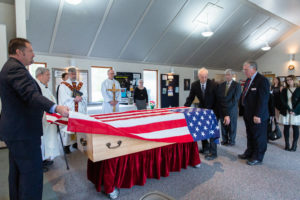
Monsignor Bill Gahagan and Father Richard Armstrong receive the body of Capt. Rosemary Mariner at her funeral Mass at St. Joseph Church in Norris. Capt. Mariner’s husband, retired Navy Commander Tommy Mariner (third from right) and daughter Emmalee (right) are shown.
According to Mrs. Nardi, Lt. Cmdr. Shults — during her eulogy — said Capt. Mariner loved her family and flying, but Jesus Christ was her passion.
Joining Lt. Cmdr. Shults at the funeral were Capt. Mariner’s fellow aviators from the Navy’s first class of female pilots.
Common refrains among those who knew Capt. Mariner were that she loved her family, friends, and flying, and she was grounded in her simple approach to life, her humility, and the Catholicism she carried with her since childhood.
“She wanted a simple low Mass. No choir. It wasn’t false humility. That was her. She wanted to be buried in a simple plain wooden casket. That’s her personality,” Mrs. Nardi said. “She was exceptional in her flying and in her faith.”

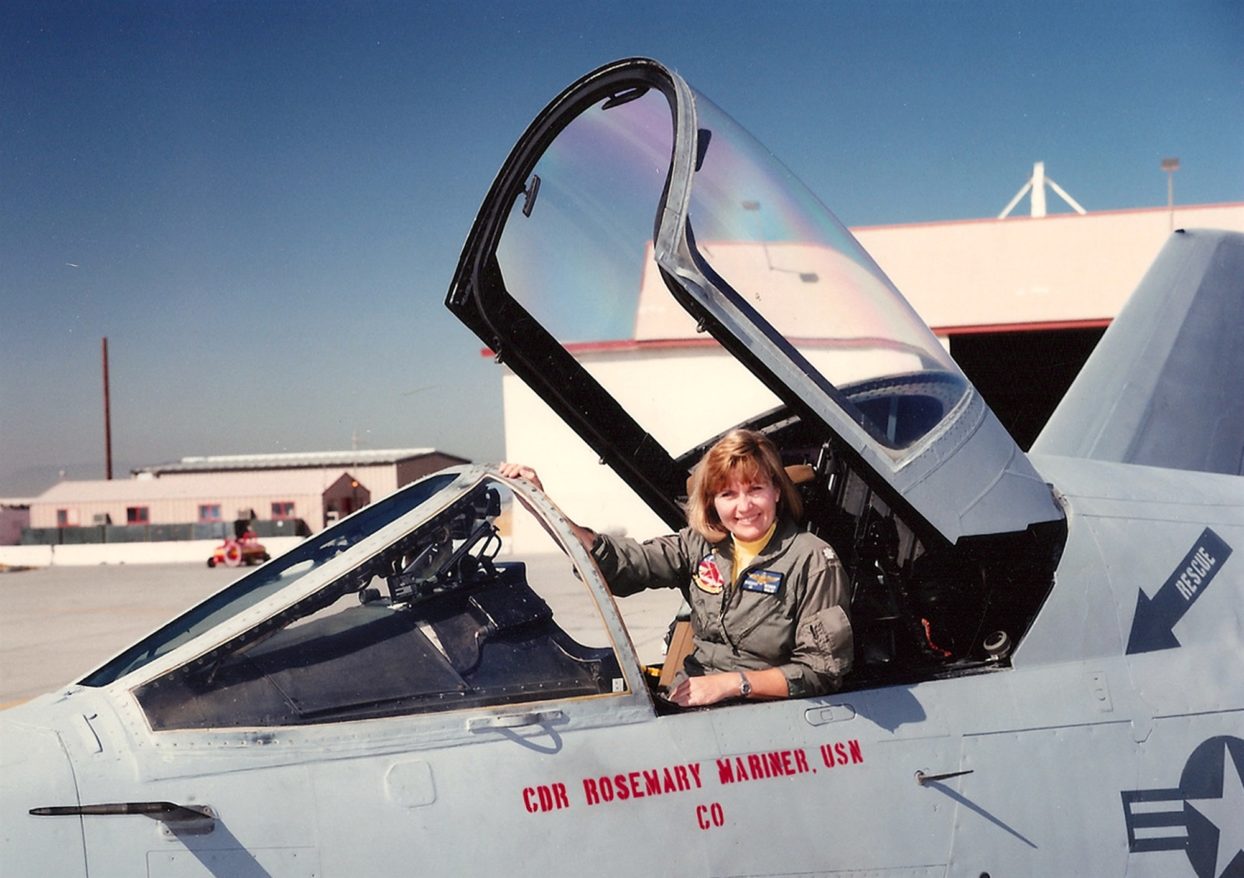
Comments 1
A better article about Captain Mariner, because they’re not trying to hide what made her great.